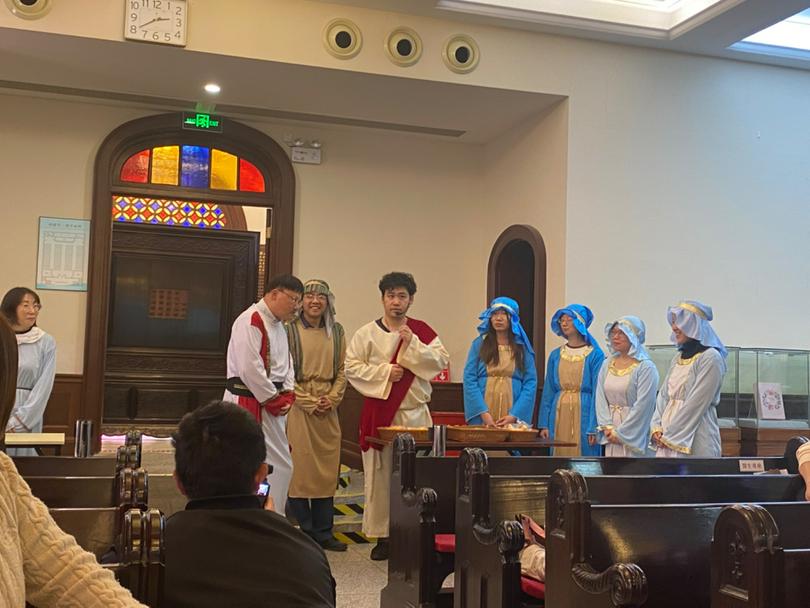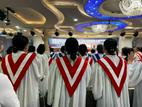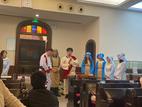At 2 p.m. on April 13, the youth fellowship of Fitch Memorial Church or Hongde Church in Shanghai staged an immersive drama titled "From Jerusalem to Calvary," depicting the events of Jesus' final week before his crucifixion.
Before the event started, the officiator led the congregation in a 15-minute prayer. Accompanied by the piano piece "Calvary's Love," the leader shared a heartfelt message: "Carrying the cross is not an empty slogan; it means laying aside personal will and following God's commands. Although it may appear that those who do not carry the cross live freely, the Lord said that anyone who does not take up the cross has no part with Christ." As the song "The Cross is Glory" began to play, the congregation quietly reflected on the redemptive power of Christ's precious blood, preparing their hearts for the following sacred drama.
The play opened in a reverent atmosphere. As the words "Palm Sunday" appeared on the screen, the actor portraying Jesus entered "Jerusalem" riding a donkey. Seated among the audience, other actors waved palm branches and shouted, "Hosanna! Blessed is he who comes in the name of the Lord!"
Next, the screen displayed "Holy Monday," guiding the audience into the events of the second day following Jesus' entry into Jerusalem. In a temple setting, vendors were seen loudly selling doves and exchanging money. At that moment, Jesus entered the temple, overturned the tables of the money changers, and declared with authority, "Is it not written: 'My house will be called a house of prayer for all nations'? But you have made it 'a den of robbers!'"
Then the third act, "Holy Tuesday," vividly showcased Jesus' wisdom and courage. When an audience member asked, "Teacher, is it right to pay imperial tax to Caesar or not?" Jesus responded calmly, "Bring me a denarius and let me look at it." After receiving the coin, Jesus asked, "Whose image is this? And whose inscription?" When they answered, "Caesar's," Jesus replied, "Give back to Caesar what is Caesar's, and to God what is God's." This was followed by a powerful scene in which Jesus denounced the hypocrisy of the scribes and Pharisees. The performance transcended time and space, enabling the audience to witness the intensity of that confrontation as if they were present.
The play then moved into the fourth act, the "Holy Wednesday." As the Bible does not provide details about Jesus' words or actions on this day, the scene portrayed the actor playing Jesus kneeling alone in prayer.
The fifth act, "Maundy Thursday," depicted Jesus sharing the Last Supper with his disciples. As he broke the bread and distributed it, he said, "This is my body given for you… This cup is the new covenant in my blood, which is poured out for you." Meanwhile, Judas quietly left the table to meet with the chief priests, agreeing to betray Jesus.
Judas later returned with soldiers to arrest Jesus, leading into the sixth act, "Good Friday." As the soldiers approached, Peter drew his sword and cut off one of their ears. Jesus reached out to heal the man and said to Peter, "Put your sword back in its place." The scene then shifted to Jesus and Barabbas, both in prison garments, standing before Pilate for judgment. The audience, acting as the crowd, shouted, "Release Barabbas." Despite Pilate's attempts to reason with them, he ultimately washed his hands to deny responsibility. Off to one side of the stage, Peter, hiding in the corner, denied Jesus three times.
The scene then progressed to the depiction of Jesus being scourged, crowned with thorns, and crucified, shown on the screen, as quiet sobs were heard among the audience.
Soft music began to play, and the drama concluded in silent prayer.
- Translated by Poppy Chan












